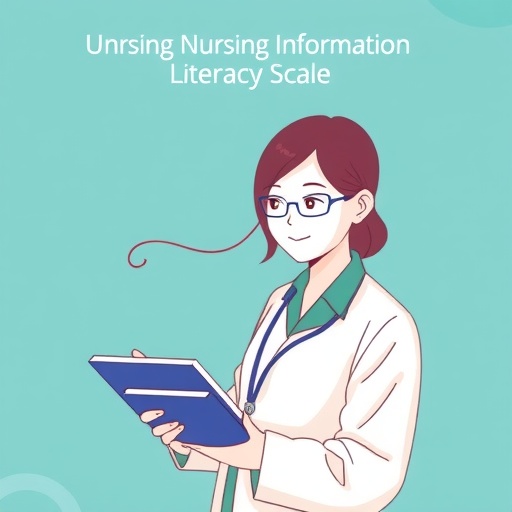In a groundbreaking development within the field of nursing education, a team of researchers led by Zou, F., and colleagues has made significant strides in the comprehensive understanding of nursing information literacy. Their research culminated in the creation of a Chinese version of the nursing information literacy scale, a critical tool that promises to enhance nursing practices across China. Given the country’s vast nursing workforce and the unique cultural scenarios they navigate, the translation, cultural adaptation, and validation of this resource are expected to be transformative.
The original nursing information literacy scale, designed to assess the ability of nursing professionals to seek, evaluate, and effectively utilize information, is pivotal in an age where evidence-based practice is the cornerstone of quality care. With an increasing volume of medical knowledge available, it is vital for nurses to possess the skills needed to filter through this information successfully. Zou and the team embarked on this project to ensure that Chinese nurses can access and apply this knowledge efficiently in their local contexts, thereby advancing healthcare outcomes.
A significant aspect of this research is the meticulous translation process. Zou, F., alongside co-authors Song, C. and Yao, L., utilized a robust method to ensure that the scale was not just translated linguistically but also culturally adapted. This is crucial in a profession like nursing, where cultural nuances can significantly impact the interpretation and application of health information. By collaborating with diverse stakeholders, the team was able to create a version of the scale that resonates with the values and practices prevalent within Chinese healthcare settings.
Validation is another critical component of this research endeavor. The authors undertook a series of rigorous assessments to determine the reliability and validity of the translated scale. Through empirical analysis and feedback from practicing nurses, the researchers could ensure that the scale accurately reflects the information literacy competencies required in contemporary nursing practice. This step is fundamental; without validation, any assessment tool lacks credibility and effectiveness.
In addition to enhancing individual competencies, this study may have broader implications for nursing education programs across China. With the integration of a culturally relevant tool for assessing information literacy, educational institutions can tailor their curricula to better equip their students. By fostering a more profound understanding of information literacy, nursing graduates can enter the workforce more prepared to engage with the wealth of knowledge available to them, resulting in improved patient care.
Moreover, the research highlights the necessity for ongoing professional development within the nursing field. As healthcare evolves, nurses must continue to hone their skills in information literacy to keep pace with the rapid advancements in medical research and technology. The findings from Zou and colleagues may serve as a catalyst for institutions to implement continuous education programs focused on enhancing these crucial skills among practicing nurses.
The potential impact of this research extends beyond nursing education, reaching into the broader healthcare system. A workforce equipped with strong information literacy skills can contribute to better health outcomes, reduced medical errors, and enhanced patient satisfaction. In an era where data-driven decision-making is becoming the norm, the ability to discern high-quality information quickly will be essential for nursing professionals.
Furthermore, the collaboration between researchers and practitioners in this study exemplifies the spirit of applied research, where findings are directly relevant to real-world practice. Zou, F. and the team engaged with various healthcare professionals throughout the research process, ensuring that the scale developed is both practical and applicable in everyday nursing tasks. This alignment between research and practice is vital in fostering a culture of evidence-based care among healthcare providers.
As this research garners attention in academic circles, the ramifications could extend beyond China’s borders. Other countries with similar cultural dimensions or challenges in nursing information literacy may look to this study as a reference point for developing their tools. The international nursing community can learn from this work, facilitating a global exchange of ideas on enhancing nursing practice through improved information literacy.
The publication of this research in a reputable journal such as BMC Nursing further underscores its significance. It provides a platform for sharing insights not only with the nursing community but also with researchers in related fields, potentially inspiring collaborative projects that bridge gaps in knowledge and practice. The dissemination of such impactful research is crucial for accelerating advancements within the nursing profession worldwide.
As the healthcare landscape continues to change under the pressures of technological advancements and globalization, studies like this one are essential. They remind us of the importance of culturally adapted research tools that are responsive to the needs of local populations. Zou, F. and their team’s initiative represents a stepping stone toward realizing a nursing workforce that is not only technically proficient but also proficient in navigating the increasingly complex world of healthcare information.
In conclusion, the development and validation of the Chinese version of the nursing information literacy scale mark a significant milestone in the field of nursing research and education. Zou, F., Song, C., and Yao, L. have created a vital resource that promises to empower nurses in China and potentially serve as a model for similar research globally. As we look towards the future, the critical importance of information literacy in nursing will undoubtedly shape the quality of care provided and the effectiveness of the healthcare system at large.
Subject of Research: Nursing information literacy scale
Article Title: Chinese version of the nursing information literacy scale: translation, cultural adaptation, and validation.
Article References:
Zou, F., Song, C. & Yao, L. Chinese version of the nursing information literacy scale: translation, cultural adaptation, and validation.
BMC Nurs 24, 1416 (2025). https://doi.org/10.1186/s12912-025-04060-2
Image Credits: AI Generated
DOI: https://doi.org/10.1186/s12912-025-04060-2
Keywords: Nursing, information literacy, translation, validation, cultural adaptation




